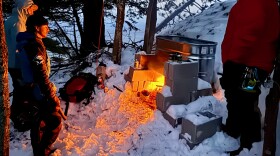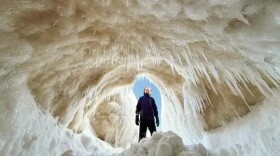James Patton is one of many caught in the aftermath. He lived at the Pines for about four years until police cleared the encampment, following the city’s newly enacted no-camping ordinance.
Patton was recently interviewed at Jubilee House, a day shelter in downtown Traverse City.
“I don't have a place to stay,” he told IPR. “Last night I was [on] the bench at the lobby at the hospital because they [sic] didn't have anywhere to go. They were done seeing me. So when I was at Safe Harbor to check in and to be put on the list. The night before that I was on the street.”
During the day, Patton used to spend time at the Pines. Now that’s not possible, and he said it’s causing issues in other public places, including the Traverse Area District Library, which was especially welcoming during COVID and the winter months.
“They don't want people loitering,” Patton said. “Most of the time there's a group of us that hang up by the library and a lot of people have been calling, and I get it. I understand there's children around, you shouldn't be cussing and swearing and doing all that stuff around children.”
Just days before clearing the Pines, city commissioners approved a permit for the emergency shelter Safe Harbor to operate year-round instead of just during the winter.
Safe Harbor offers 74 beds, but many local homeless residents say that’s still not enough.
Brad Gerlach, Safe Harbor’s volunteer coordinator, confirmed the shelter is turning away between two and five people a night, mostly men. Services, he said, have otherwise stayed the same with small differences: The facility now staying open an hour later than it used to, but is no longer providing evening meals.
At Jubilee House, Director Hannah Wescott said her staff is trying to help people find places to stay, but the city’s no-camping ordinance is complicating their efforts.
Now, staff are hesitant to hand out camping supplies, worried it could lead to people violating the city’s new rules.
“We're walking this really delicate line between wanting to not get our friends in trouble with the materials that we give them, and also knowing that they need a safer option to keep them warm and dry overnight when they can't get into the shelter,” she said. “That is absolutely still the reality. There are plenty of folks who are sleeping outside, but they need to be able to pick up and go quickly so that they don't violate any ordinances while they're trying to survive.”
It can get confusing. During our interview, a staff member walked into her office with a question about whether they can give a newly homeless person a tent. Wescott clarified that tents are only to be given out under the direction of Traverse City's Quick Response Team — or QRT — which provides services to homeless individuals and helps with overdose prevention.
Wescott said people are now sleeping in more hidden spots or trekking farther out of town, putting them farther from downtown resources.
“Transportation has always been a huge problem for our friends,” she said. “All the resources are pretty far flung, with the exception of the Safe Harbor to Central Methodist to Jubilee House triangle. We three partner together to make sure that there's always a place for people to go.”
Jennifer Holm, a police social worker coordinator with QRT, said her team has gotten busier since the Pines was cleared.
More from others
The Northern Express recently wrote about this, too. Read their story.
“We've seen an uptick in referrals to the QRT,” Holm said. “So from our law enforcement officers who typically make about 40% of our referrals anyway, we have seen an increase in referrals to the QRT. I think that is... our law enforcement trying to get to the bottom of people's law enforcement contacts and connect them with resources.”
Holm said that Safe Harbor opening year-round has been a helpful resource but she understands community concerns.
“Being able to have that resource in our community is fantastic,” she said. "We know there are concerns with it, and we don't discount the community's perception of those. We know there's more work to be done, and there's work in progress to move forward for that.”
For now, many like James Patton are still left waiting, caught between the promise of shelter and the daily struggle to find a safe place to sleep.
This story is also the latest episode of the Up North Lowdown, IPR's podcast of feature reporting available to hear on demand.







